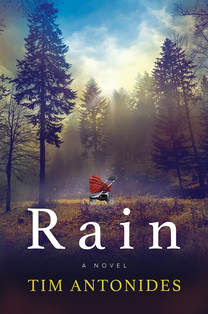 Tim Antonides is a writer and teacher who lives in suburban Vancouver with his wife Monica and twin sons. His debut novel Rain is a family drama about a couple’s desperate quest to have a child. Though Tim’s insightful work is written from the male perspective, anyone who has been there can relate. Raw but hopeful, I believe it should be required reading for anyone experiencing infertility. Find the novel here: Rain Connect with the author: http://timantonides.com/ Rain: A Novel, is the most honest portrayal of infertility that I’ve ever read. What motivated you to write this story? After my wife Monica and I experienced our first failed IVF cycle, I began to scribble notes in a journal. It began as a way to document what we were going through, but it ended up becoming a vehicle through which to process the profound and confusing emotions that erupted during the remaining four cycles we did: the hope, grief, anger, bitterness, envy, and everything else that came with the entire process. Those notes became a short story, which eventually became a novel. In the end, my motivation became two-fold: To write a great story and to take the reader into a world that isn’t talked about very much, particularly among men. How close to your own experience was Rain? There are elements of my own experience that have influenced the novel, for sure. This is especially true of the emotions that Mitchell experiences and struggles with. Other than the scene where Mitchell is humiliated by his English teacher, none of the events are purely autobiographical. Rather, they are a blend of fictionalized events and characters, though many of them are loosely based on reality. Like Mitch and Sharelle, Monica and I went through five IVF cycles. I also have a brother and sister-in-law who went through IVF at the same time as we did, though I get along much better with Rob than Mitch does with Trevor! The story is told from the male point of view, and Mitch, the protagonist, is flawed but well meaning. After the prologue, we meet him as a teenager. How did you decide to weave his past into his present throughout the novel? I’ve always been fascinated with the ways in which our past experiences shape who we are today. I wanted to create a novel where echoes and whispers of the past affect the now. One of my mentors, the author Connie May Fowler, calls Rain a book about monsters—monsters that haunt our dreams and threaten to undo us. As a child and teenager, Mitchell is pursued by the monsters of inadequacy, self consciousness, a hallway bully, and his father. As an adult, the monsters become the failure to conceive a child, the inability to accept that he is enough as a man, the fear that his wife no longer loves or accepts him as he is. The monsters have changed form, but they are very real. By echoing particular imagery in both past and present, particularly with respect to water and the memory of specific words and gestures, a unifying thread started to appear. A lot of this appeared subconsciously as I wrote, so it’s almost like I can’t take credit for it… Would you ever consider writing from Sharelle’s (Mitch’s wife) point of view? I actually did a fair bit of experimentation with that idea. I toyed with the idea of writing the book from two alternating points of view, Sharelle’s and Mitch’s. Monica and I have been very open with each other about how we felt and what we experienced emotionally during our IVF journey. In the end, I didn’t feel I could do justice to Sharelle’s perspective. Maybe because I had so much that I wanted to say from a male perspective. However, I think it would be an exciting and completely different adventure to write this story from Sharelle’s point of view. You divide the novel into parts of the IVF process (stimulation, retrieval, etc.) They perfectly parallel the emotional process of going through IVF. Can you talk a bit about that parallel? I love that you had that reaction to the structure of the book! I agonized for a long time about how to organize the chapters. I was pacing the living room one morning thinking about it, and the idea jumped out at me. What if I could use the stages of the IVF process to structure the story? I wrote down these stages and started going through the manuscript to see if it could work. Honestly, the hairs on the back of my neck stood up. It worked perfectly! In the Stimulation section, there is a very strong theme of Mitchell’s desire for love and acceptance (sexual, yes, but so much more than that). In the Retrieval phase of the book, Mitch begins to retrieve memories of his father and grandfather that start to create meaning for him. There is then a transformation and a new clarity for him that grow in the Incubation phase of the book. Finally, there is a need for him to replace his old life with a new version in Replacement. And Genesis, the final phase? Well, I won’t spoil that for anyone who hasn’t read the book yet… You do a wonderful job of portraying how quickly and deeply relationships can be affected by infertility, can you talk about this aspect of the couple’s journey? Thank you! As I’m sure your readers can attest, infertility exposes every fissure in your relationship. Insecurities and fears (some of which you didn’t even know were there) suddenly come popping to the surface. The world has been turned upside down. What you thought would be a natural and joyful phase of your life is suddenly withheld from you, completely out of your control. Mitch and Sharelle are no different. They are each trying to keep themselves together while remaining strong for their partner. As the IVF process unfolds, they both become weaker—trying to keep the other afloat as they themselves tread water. I think that’s a pretty common experience, and it can really take its toll. What do you want people to walk away with after reading Rain? The writer part of me wants them to be truly satisfied with having read a wonderful novel. For me, any really great book I’ve read lingered long after I’ve finished. I also like books that make me laugh and tear up at the same time. Initial reviews of the book are showing me that Rain is such a novel. Readers have shared with me that they wanted to go back because they feel could get even more from another reading. The “infertility-survivor” part of me wants them to walk away with heightened empathy and a deeper understanding of how profoundly difficult the infertility journey is. That every month can be a journey through the grief cycle. That we all need to listen, fertile and infertile, to the stories of those for whom having a child is a terribly difficult and sometimes impossible reality. This might sound strange from a writer but I think we can all use words more sparingly and just listen.
0 Comments
Leave a Reply. |
